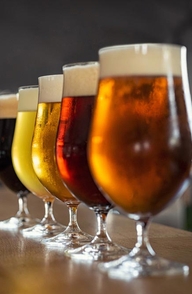Start 14-Day Trial Subscription
*No credit card required

Depression After Quitting Drinking – There Is a Better Way
Explore how quitting alcohol can lead to unexpected depression, and discover effective strategies and support systems that promote mental well-being and lasting recovery.
If you’ve recently stopped drinking, you might be experiencing unexpected feelings of depression. This is a common occurrence for those recovering from alcohol use disorder.
During this recovery process, your body and mind adjust to life without alcohol. As the fog clears, depressive symptoms may arise, but this is where structured programs can guide you to a healthier and happier state.
The Link Between Alcohol Use and Depression
Alcohol and depression often have a cyclical, intertwined relationship. For many, alcohol becomes a way to self-medicate, easing the symptoms of depression or anxiety disorders temporarily. However, alcohol itself is a depressant and can exacerbate the very feelings people are trying to escape, leading to a worsening of depressive symptoms over time.
Research shows that there is a bidirectional relationship between alcohol use and depression. Individuals with alcohol use disorder (AUD) are at a higher risk for developing depressive disorders, and those with pre-existing depression are more likely to misuse alcohol as a coping mechanism. Over time, this pattern can turn into a vicious cycle where alcohol worsens mental health, and declining mental health drives further drinking.
Programs like MyDry30 recognize the need to break this cycle by offering a holistic approach to quitting alcohol. Rather than focusing solely on stopping drinking, the program addresses the underlying mental health issues that often accompany alcohol addiction. Through a combination of hypnotherapy, journaling, and informative reading, this app helps individuals understand the emotional triggers behind their drinking and develop healthier coping mechanisms.
This holistic focus not only reduces the risk of relapse but also helps in treating co-occurring disorders like depression. By shifting the relationship with alcohol from one of dependency to mindful moderation or abstinence, individuals can take control of their mental well-being while mitigating the harmful effects of alcohol on the brain’s chemistry.
Understanding Alcohol Withdrawal and Its Role in Depression
Quitting alcohol can trigger various withdrawal symptoms, some of which can intensify feelings of depression. In the early stages, many people experience acute withdrawal syndrome, which may bring about anxiety, restlessness, and sleep disturbances. For some, these symptoms extend into post-acute withdrawal syndrome (PAWS), where depression and cognitive difficulties can persist for weeks or even months.
Using tools like hypnotherapy and journaling during this period can help ease withdrawal by reducing cravings, managing emotions, and gaining clarity about personal triggers.
Managing Depression After Quitting Drinking
Addressing depression after quitting alcohol often requires a combination of self-reflection and professional support. Techniques like cognitive behavioral therapy (CBT), motivational therapy, and other therapeutic interventions can help manage depressive disorders and co-occurring conditions like anxiety.
Incorporating practices such as daily hypnotherapy, introspective journaling, and mindful reading can help individuals develop healthy coping mechanisms, manage depressive symptoms, and improve mental resilience during this period.
Factors That Influence the Duration of Depression After Quitting Drinking
The duration and intensity of depression after quitting alcohol can vary based on factors like the length and severity of alcohol use, underlying mental health issues, and available support. Prolonged depressive symptoms may arise in individuals who used alcohol to manage anxiety disorders or post-traumatic stress disorder.
Access to resources like meditation, breathing exercises, and professional coaching can improve treatment outcomes and help regain control of your mental well-being.
Effective Coping Strategies and Long-Term Recovery
Recovery from alcohol is about building positive routines, self-care, and personal growth. Developing healthier coping mechanisms helps manage the emotional ups and downs of recovery. Regular meditation, journaling, and connecting with support groups can reduce alcohol-induced anxiety and stress, guiding you toward a brighter, alcohol-free future.
Engaging in ongoing therapy and maintaining long-term strategies will help sustain your mental health and prevent relapse.
The Role of Professional Help in Managing Depression After Quitting Alcohol
If you are experiencing persistent symptoms of depression after quitting alcohol, seeking professional help is important. Programs and apps that offer a structured platform for emotional and mental recovery can be vital during this period. Access to medical support, coaching, and therapeutic interventions ensures that you have the guidance needed to manage post-alcohol depression effectively.
Taking this step allows you to address the underlying causes of your drinking habits, learn healthier ways to cope, and secure a successful recovery.
MyDry30: Your Partner in Recovery
MyDry30 offers a structured, supportive approach for those taking a break from alcohol and dealing with the emotional and physical challenges that come with it. Designed to guide you through a transformative 30-day journey, MyDry30 combines hypnotherapy, journaling, and mindful reading to help you redefine your relationship with alcohol.
With just 30 minutes a day, you’ll gain insights into your drinking habits, learn how to manage cravings, and develop healthier ways to cope with stress and emotions. Our program focuses on the subconscious, which plays a critical role in habit formation. By addressing underlying triggers through daily hypnosis, this app helps you rewire your thinking, making lasting change easier and more effective.
Whether you’re seeking to quit drinking entirely or simply want to take a break, MyDry30 provides the tools and resources needed for both short-term recovery and long-term mental and physical health benefits.
Start your journey today, and let MyDry30 be your guide to a happier, healthier you.
Conclusion: Take Control of Your Journey
Dealing with depression after quitting drinking is a challenging part of recovery, but it's crucial for long-term health. True transformation requires more than just willpower; it requires a deeper shift in mindset. With the right tools and daily practices like hypnotherapy, journaling, and reflection, you can navigate the emotional challenges of quitting alcohol and emerge stronger on the other side.
Starting this journey today can help you break free from alcohol and its emotional burden, giving you the tools to live a happier, healthier life.



